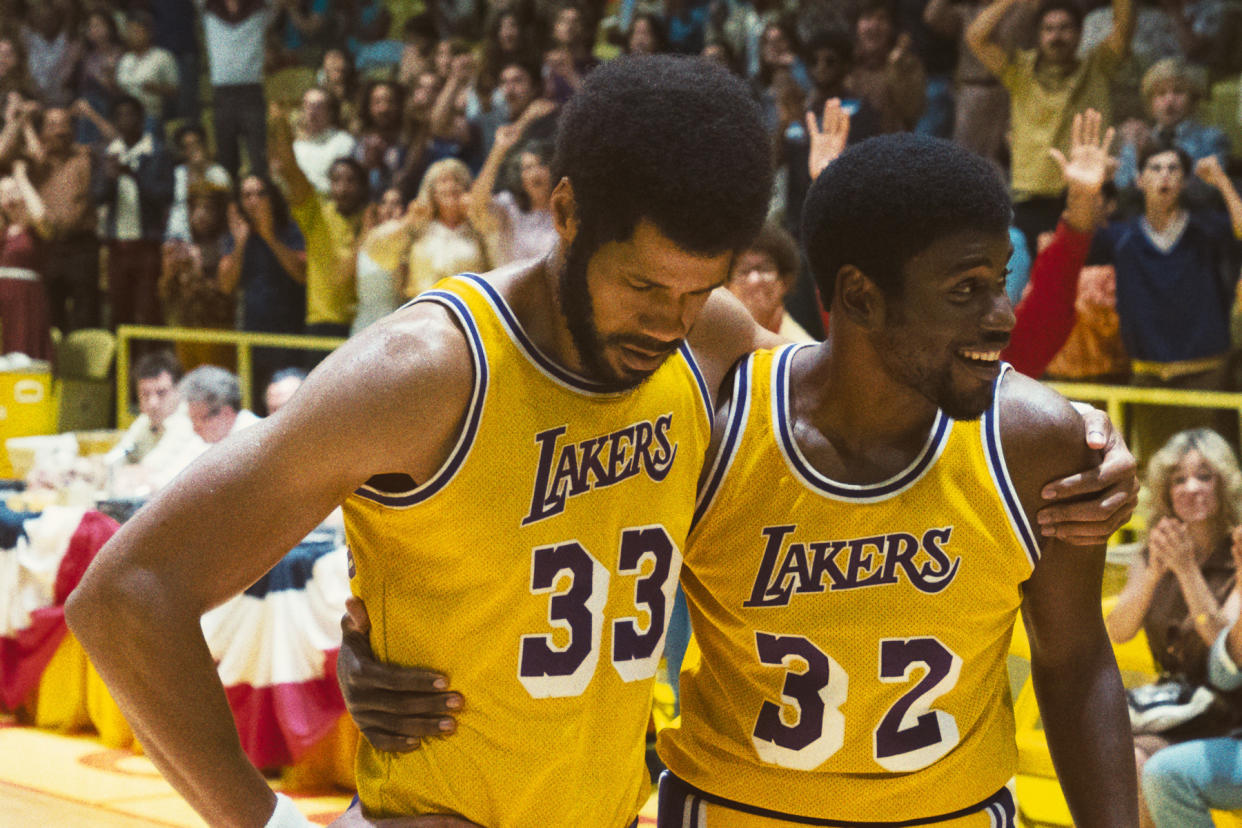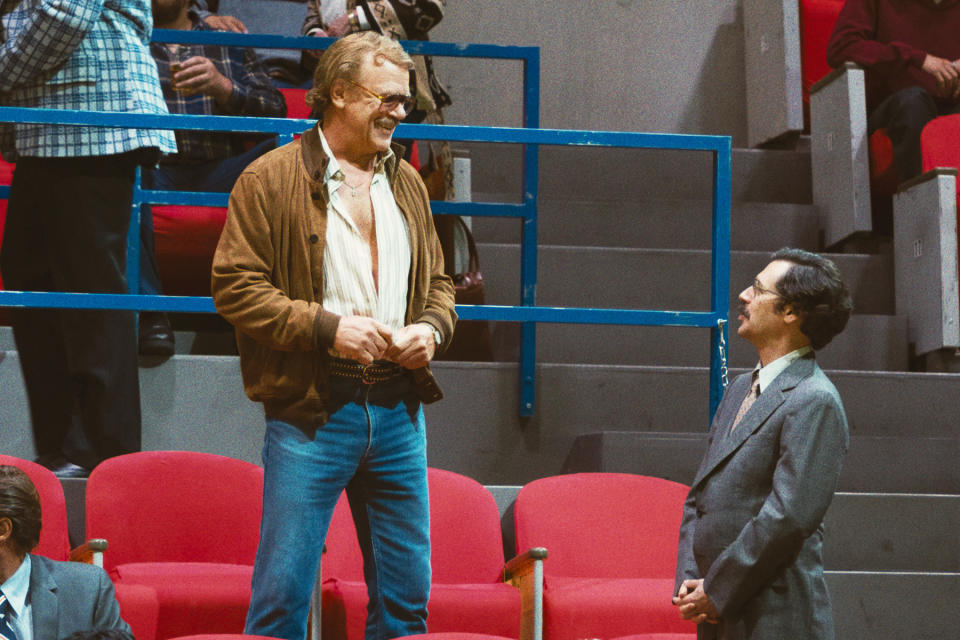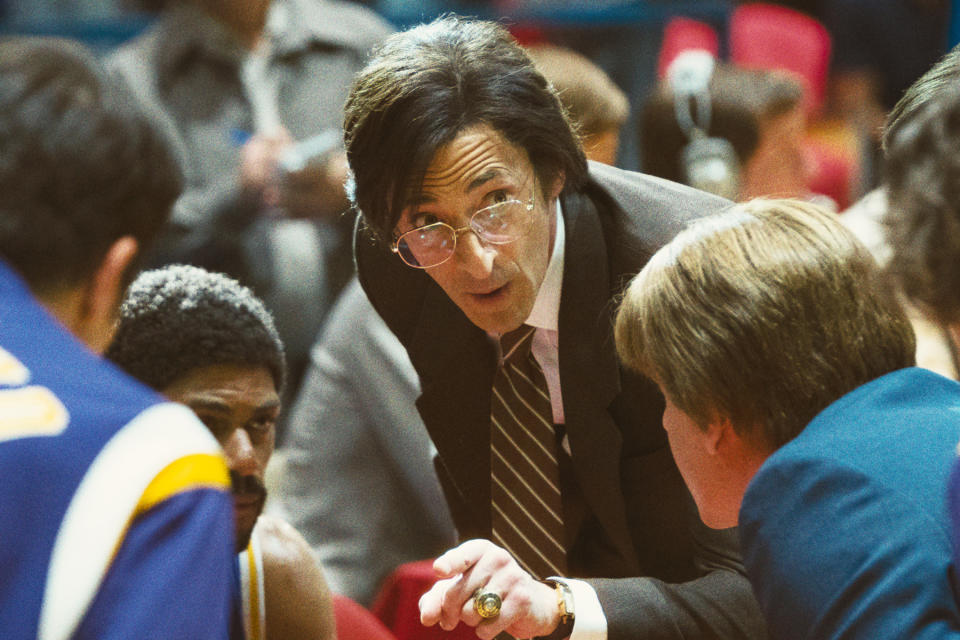‘Winning Time’ Finale: A Magical Run, a Title, and Some Unfinished Business

- Oops!Something went wrong.Please try again later.
- Oops!Something went wrong.Please try again later.
A review of the Winning Time season finale, “Promised Land,” coming up just as soon as I get you on a last-minute helicopter to Philadelphia…
A surprising thing happens right after the opening credits to the finale: Jerry Buss begins talking directly to the audience. This is the first time he, or any Winning Time character, has addressed us in quite some time, and it’s a bit unnerving to be reminded of how frequently it happened at the beginning of the season. It’s not that the show completely calmed down in recent episodes, as even this finale is still constantly mixing up film stock, and giving both Jerry and Magic hallucinatory conversations with, respectively, Jessie Buss and Larry Bird. But if the series’ earliest installments were a 10 (if not an 11) on a scale of stylistic excess, the creative team has more recently dialed things back to a seven or an eight, and even that small adjustment has worked wonders. The true story of the Showtime Lakers is so rich and strange and surprising — yes, Spencer Haywood really did try to put out a hit on his old team (mainly Paul Westhead), then got too high to follow through — that it hasn’t required nearly the amount of garnish that Adam McKay and company felt compelled to apply at the start of the season. And Magic’s championship-clinching performance in Game 6 against Philadelphia — one of the greatest single-game playoff performances in NBA history, and arguably the defining moment of Magic’s entire career(*) — is such a perfect capper to the story of this season that it requires minimal embellishment.
More from Rolling Stone
'Winning Time' Recap: The Fast-Break Lakers Slow Down to Say Goodbye
'Winning Time' Recap: The Road to the NBA Title Is Paved With Bullshit
(*) It’s that or the end of Game 4 of the 1987 NBA Finals.
Fortunately, even with the return of the direct address — where Dr. Buss revisits the swan metaphor from the series premiere and explains the origin of the phrase “swan song” — “Promised Land” is as straightforward as Winning Time gets. It starts out by introducing the final obstacle to a Lakers title, with Kareem badly spraining his ankle during Game 5, then devotes the bulk of its running time to the team — and particularly its precocious, versatile, defiant rookie star — fighting its way through to glory on the other side.
The episode skips past the first four games of the series, which mainly means we don’t get to see how well the production can recreate Dr. J’s legendary baseline scoop shot. Kareem has been his usual dominant self, averaging more than 34 points per game and building a 3-2 series lead for the Lakers before the ankle injury takes him out of the series. He has changed as much as anyone over the course of this season, reinvigorated by Magic’s presence and the Jack McKinney offense, and there’s a lovely moment early on in the locker room where his girlfriend Cheryl makes him loudly admit how much he wants to win this game, despite his earlier ambivalence about basketball. Though Magic is the engine that makes the Lakers’ offense go, Kareem is pretty much the rest of the car. Without him — and with Philly presenting an enormous frontcourt with Caldwell Jones and Daryl “Chocolate Thunder” Dawkins — that 3-2 lead instead feels like it’s the Lakers who are on the brink of elimination.

Warrick Page/HBO
But inspired by his captain, Magic volunteers to play center, figuring his speed at the position will at least neutralize the bulk of Jones and Dawkins. It is something of a full-circle moment for the season — recall that, when he was still technically the coach, Jerry West wanted to treat Magic as a big man rather than a point guard — but also a marker of Magic’s confidence in himself and his desire to remind the basketball world that he shouldn’t be an afterthought in the Larry Bird coronation story. (And as a wonderful added grace note, Jack gives Paul his own plans for how to play Philly without Kareem, which includes the exact same idea of playing Magic at center.)
With a few exceptions like the Boston Garden game, the series to this point has dispensed with game action in quick montages, rightly believing that the off-court events are both more interesting and easier to dramatize than the athletic feats of men like Kareem, Magic, and Dr. J. In this case, though, you cannot tell the story of the 1979-80 Lakers without an extended sequence about Magic’s triumphant performance. “Promised Land” wisely lets Game 6 take up more than a third of its running time, and the simulated game action is pretty sensational. Everything is shot(*) and cut together beautifully, and the sequence deftly mixes on-court drama with the human stories surrounding it, including Jerry West stalking through the bowels of the Spectrum trying to keep his emotions in check, Jeanie Buss rightly feeling frustrated that her dad took her two useless brothers to the game while leaving her behind to pack up Jessie’s things, and Jack and Kareem each having to live vicariously through the coaches and players who get to finish the thing they started. But we also get a good sense of how unprepared Philadelphia is for this small-ball lineup, how deftly Magic switches from playmaking for others to scoring himself, and how much it takes out of him to do so much for so many minutes. He gets a desperately-needed pep talk from Norm — who once wanted nothing to do with another point guard on the team, but now recognizes how much Magic means to them all — and then a perfectly-timed bit of motivation from Pat Riley, who tells him that Bird won the Rookie of the Year vote by a 63-3 landslide over Magic.
(*) Just think for a moment about the run that director Salli Richardson-Whitfield is on right now. She directed the final two episodes of this season, featuring so much searing drama and so much basketball. She directed four episodes of The Gilded Age, which is this series’ spiritual and stylistic opposite in almost every way. And before that, she directed several episodes of Amazon’s fantasy epic Wheel of Time, which requires an entirely different skillset from these other two shows.
And where the series has at times significantly deviated from the historical record, this is largely how Game 6 played out. Despite Magic’s superheroics, Philadelphia was still hanging around, down by only two points relatively late in the fourth quarter, before the Lakers finally pulled away, Magic dunked, etc. We’ve talked a lot over these last 10 weeks about fact versus fiction, and how much a docudrama like this is required to stick to the reality of the situation. Here, what actually happened is too dramatically interesting to require extra flourishes, and “Promised Land” wisely doesn’t try to add any.
The victory does not solve all that ails Laker Nation, though it helps with a lot of things. Jerry Buss is nearly broke, but the championship title gives him the equity he needs to turn the Lakers into a thriving business — and one that he smartly picks Claire Rothman to run with him, rather than trying to promote one of his sons above their level of competence. Jerry West allows himself to smile a few times during the game, and afterwards takes Bill Sharman up on his offer to join the front office. Magic gets his moment in the sun (and the Finals MVP trophy that should have been Kareem’s, if not for David Stern’s desire to use the Magic-Larry rivalry to boost the league as a whole), but he still has showdowns with Larry in his future to truly determine who’s the better player, and he’s still sleeping with every woman he can find while remaining estranged from Cookie. And in a powerful scene, Kareem is able to talk Spencer Haywood down a bit from his drug-fueled self-loathing, but the power forward clearly has a long way to go.

Warrick Page/HBO
The Winning Time creators have been mum about what a second season of this series would cover. There’s still a lot to the story of the Showtime Lakers, but HBO also bought the rights to Jeff Pearlman’s Three-Ring Circus, about the Shaq-Kobe Lakers, and it’s possible we would simply jump ahead. My guess is we get more of Magic and friends first, for a couple of reasons: 1) We haven’t yet returned to the series-opening glimpse of Magic on the day of his HIV diagnosis, and 2) I imagine all involved want to give Adrien Brody a chance to play the version of Pat Riley who becomes as much a star in the Eighties as Magic or Kareem.
This season was messy and self-indulgent. It was also an incredibly watchable mix of highbrow and lowbrow, as exemplified by the halftime scene here where Paul recites the “band of brothers” monologue from Henry V and then Pat adds, “Let’s kill those fuckers!” There is a risk that remaining in this era will require more than this combustible mix of creative elements can handle. But for the moment, it probably makes sense for all involved to follow what Jerry Buss tells Brent Musberger during the championship trophy ceremony: “Now I guess we do it all over again!”
Best of Rolling Stone

